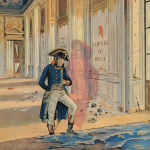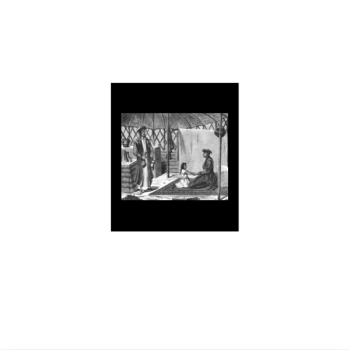A Tournament Of Shadows:
XXIV. Princess Dolgorukaya
After two months’ stay in Kiev, Andrei Mikhailovich was sent to quarters down the Dnipro River in the village of Rzhyshchiv which belonged to Countess Dzyalinskaya. Part of the Russian Empire since 1796, for the past ten years, since 1802, it was home to a dynasty (branch) of a new sect of Judaism called “Hassidism,” founded in Western Ukraine in the eighteenth century by Israel Ben Eliezer, the “Baal Shem Tov.” The spiritual revival movement drew upon several sources for its theology, including the mystical writings of the Kabbalah, the Bible, as well as later Rabbinical authorities.[1] It also drew heavily on sources foreign to Judaism, like its Christian analog, the Russian schismatics (which emerged around the same time.)[2]

Rzhyshchiv (Napoleon Orda.)
In Rzhyshchiv Andrei Mikhailovich met Elena Pavlovna Dolgorukaya, a remarkably cultured woman, especially considering that in those days no one thought that girls should be taught anything other than handicrafts, housekeeping, and perhaps (in the richest noble families) French and German. Elena Pavlovna was a botanist of no small achievement (and was amassing a vast collection of flora with scientific descriptions of each plant.) In addition to speaking several languages fluently, Elena Pavlovna was expert in several disciplines (history, geography, botany, archeology, and numismatics,) acquiring said knowledge not from teachers, but from her own tireless work, curiosity, and persistent zeal for knowledge. [3] (Elena Pavlovna owed part of her multifaceted development, and love for serious studies, to her close proximity and friendship with the Countess Dzyalinskaya, who was herself a very educated woman.) She was a descendant of Prince Yuri Dolgoruky (who founded Moscow in 1147) on her paternal side and the last representative of the senior line of this ancient family.[4] Though she belonged to one of the first princely houses in Russia, her father, Prince Pavel Vasilyevich Dolgoruky, was a poor man, and she spent her childhood and youth almost exclusively in the village.[5]
When Andrei Mikhailovich met her, she was living in the house of her maternal grandmother, Elena Ivanovna Bandre du Plessis (née Briseman-von-Nettig,) widow of Lieutenant General Adolf Frantsevich. Elena Ivanovna was born in the Duchy of Livonia, which the Russian Empire captured during the Great Northern War. Adolf Frantsevich was of French extraction; his grandfather, a Huguenot, was forced to leave his homeland during the French Wars Of Religion and settled in the Kingdom of Saxony and occupied an important official position. Adolf Frantsevich himself served in the military of Saxony in his early youth and, with the rank of captain, at the invitation of Russia, transferred to Russian military service at the beginning of the reign of Catherine the Great. He participated in nearly all of the wars of her reign as well as commanded a regiment during the Crimean Campaign. He was loved by Russian military hero, Count Alexander Vasilyevich Suvorov, and involved in diplomatic affairs (especially Poland and Crimea.) Around 1790 he retired due to illness and settled on his estate, “Nizki,” in the Mogilev Province. Part of the estate was given to him by the State (confiscated from the Polish landowner, Chudovsky,) and part of it was purchased with his own funds. Unfortunately, due to his ignorance of the laws and chicanery of the time, some omissions in formalities crept in during the acquisition of this estate, because, after his death in 1793, the former owners of the estate mercilessly harassed his widow. As a result, Elena Ivanovna was forced to vacate the property in 1796 and move to Kiev.
Elena Ivanovna and Adolf Frantsevich had one daughter, Henrietta Adolfovna, the mother of Elena Pavlovna. In 1787 she was given in marriage to Prince Pavel Vasilyevich, then Colonel of Kyazi. Remarkable for her beauty, but with a somewhat frivolous and peculiar character, Henrietta Adolfovna loved the world and going out, which was the reason for her disagreements with her husband, a serious man. Though he was not wealthy, the currency of Pavel Vasilyevich’s name still held much value. One of Catherine the Great’s generals, he was far from an ordinary person. Distinguished by a highly enlightened mind and versatile special knowledge, he enjoyed great respect from everyone who knew him. He was a remarkable linguist who knew several ancient languages, and being fluent in six modern languages, spoke them quite freely.[6] All his free time was spent in serious study inside his huge library, composed mainly of books of scientific content—even the occult sciences.[7] In the late 1770s, he was initiated into Rosicrucian Freemasonry, the Rite of Strict Observance. Founded in Germany in 1754, the pedigree of this Masonic Fraternity included the heritage of the Knights Templar, alchemical formulas, kabbalistic magic, and claimed to derive its teachings from “Unknown Superiors.” It was even rumored that Pavel Vasilyevich met Count Cagliostro himself when the latter visited Russia.[8]

(Left) Pavel Vasilyevich Dolgorukov.
(Right) “Victory of Ochakiv,” by January Suchodolski.
From the marriage of Pavel Vasilyevich and Henrietta Adolfovna, there were two daughters. The eldest was Elena Pavlovna, born on October 1, 1789, in the house of her mother’s parents. At the time of Elena Pavlovna’s birth, Pavel Vasilyevich was commanding the Tver Dragoon Regiment during the decisive battle at Özi. In the summer of 1790, Pavel Vasilyevich was among the Russian and Cossack troops under the command of General Suvorov who stormed the Turkish fortress of Izmail. After the battle, Pavel Vasilyevich rescued the daughter of a rich Turk who was accosted by some Cossacks. (Pavel Vasilyevich took her into his household where she was given the name Alexandra Andreevna. She no longer lived in luxury, but she was provided for.)[9] Pavel Vasilyevich and Henrietta Adolfovna would have another daughter, Anastasia Pavlovna, but their relationship was ultimately not sustainable, and the two often lived apart. Their children were raised by their maternal grandparents. (Henrietta would later reconcile with Pavel and spend the last three years of her life with him.)[10]
Elena Pavlovna was only four years old when Adolf Frantsevich died, and though she was very young, the event left a deep and permanent impression on her. Many decades later, even in advanced years, she could not think of her grandfather without a special feeling of love and tenderness. The mutual love for grandmother and granddaughter was also unlimited. The entire fortune of Elena Ivanovna, after the loss of her estate, was thirty thousand rubles in banknotes and five hundred rubles in pensions, which she received from Empress Maria Feodorovna (the benefactor of many a widow and orphans.) Elena Ivanovna used part of her small capital to move to Kiev, purchase a house, and then take out a lease in Rzhyshchiv with a mortgage that consisted of a contract with a plot of land and several peasants. With her meager means, she gave her granddaughter the best education she could. Countess Dzyalinskaya ended up purchasing the land pledged to Elena Ivanovna, but as a gesture of friendship, she allowed her to live in her house free of charge after her death, along with a piece of land. Pavel Vasilyevich, meanwhile, having retired with the rank of Major General at the beginning of the reign of Tsar Pavel Petrovich, lived on his severely ruined estate, “Marfovka,” in the Penza Province.[11]
This was the situation in 1812 when Andrei Mikhailovich met Elena Pavlovna and Elena Ivanovna in Rzhyshchiv. Henrietta Adolfovna had recently died, the former was mourning the death of her mother, and the latter was mourning the death of a daughter. Andrei Mikhailovich was not without his own grief, as his brother, Alexander Mikhailovich, was killed in the Patriotic War against Napoleon. The common desire for literary pursuits brought Andrei Mikhailovich and Elena Pavlovna together. They read together, translated together, and finally, sincerely fell in love together. By their mutual agreement, Andrei Mikhailovich asked Elena Ivanovna for permission to marry her granddaughter. Initially, this request was met with strong opposition from Elena Ivanovna, for, in their strong desire to be united, the young couple had not considered how they would support themselves. Elena Ivanovna’s small fortune, which she had bequeathed to her granddaughter, was only enough to satisfy the basic necessities, and Elena Pavlovna, out of delicacy, did not want to receive help from her grandmother while she was alive. Prince Pavel Vasilyevich was in very strained conditions due to a breakdown in health, and his modest pension was only barely enough for his own survival. Asking for his support was out of the question. Mikhail Ilyich, supporting half-a-dozen family members already, could not imagine a prosperous position for the sweethearts.
“If you do not give your blessing, I will not resist your will,” Elena Pavlovna told her grandmother, resigned to her fate. “However, I will never marry anyone else in the world.”
This thawed the milky ice of reason to translucence in Elena Ivanovna, and the shape of sympathy was at least visible.
Reinforcements came in the form of the poetess, Elizaveta Mikhailovna Seletskaya, a cousin of Prince Pavel Vasilyevich, and the sister of Prince Ivan Mikhailovich Dolgoruky (a famous poet of the time.) Elizaveta Mikhailovna, a landowner who lived at her estate, “Kovalyakh,” near Rzhyshchiv, was quite fond of Andrei Mikhailovich and convinced Elena Ivanovna of the young man’s quality and ability.
“It is not wise to resist this marriage because of poverty alone,” Elizaveta Mikhailovna declared. “They will not be lost.”
Elizaveta Mikhailovna was joined by some Polish landowners, who greatly respected Elena Ivanovna and her late husband. Thus, with the blessing of Elena Ivanovna, Prince Pavel Vasilyevich, Mikhail Ilyich, and Ekaterina Andreevna, their marriage was complete. The wedding was held in the home church of Elizaveta Mikhailovna on February 9, 1813. The newlyweds settled in Elena Ivanovna’s home in Rzhyshchiv. At the time of their wedding, Andrei Mikhailovich had only one hundred rubles to his name.
SOURCES:
[1] Eliach, Yaffa. “The Russian Dissenting Sects And Their Influence On Israel Baal Shem Tov, Founder Of Hassidism.” Proceedings Of The American Academy For Jewish Research. Vol. XXXVI. (1968): 57-83.
[2] Hardwick, Susan W. “Religion And Migration: The Molokan Experience.” Yearbook Of The Association Of Pacific Coast Geographers. Vol. LV (1993): 127-141.
[3] Witte, Sergei Yulyevich; Yarmolinksy, Abraham (Translator) The Memoir Of Count Witte. Doubleday, Page & Company. Garden City, New York. (1921): 4.
[4] Johnston, Charles. “Madame Blavatsky’s Forbears.” The Theosophical Quarterly. Vol. XXX, No. 1 (July 1932): 12-16; Zhelihovskaya, Vera Petrovna. My Childhood. A. F. Devrien. St. Petersburg, Russia. (1893.) [Preparation of the text and comments by A.D. Tyurikov. Bahmut Roerich Center; Zhelihovskaya, Vera Petrovna. “Helena Andreyevna Hahn, Zeneida R-va.” (1885.) [Preparation of the text and comments by A.D. Tyurikov. Bahmut Roerich Center.
[5] Zhelihovskaya, Vera Petrovna. My Childhood. A. F. Devrien. St. Petersburg, Russia. (1893): 62-69.
[6] Fadeyev, Andrei Mikhailovich. Vospominaniia: 1790-1867: Vol. I. Vysochaishe Utverzhd. Yuzhno-Russkago. Odessa, Ukraine. [Russian Empire.] (1897): 35; Johnston, Charles. “Madame Blavatsky’s Forbears.” The Theosophical Quarterly. Vol. XXX, No. 1 (July 1932): 12-16.
[7] Mikhailovich, Andrei Fadeyev. Vospominaniia: 1790-1867. Vysochaishe Utverzhd. Yuzhno-Russkago. Odessa, Ukraine. [Russian Empire.] (1897): 126.
[8] Goodrick-Clarke, Nicholas. Helena Blavatsky. North Atlantic Books. Berkeley, California. (2004): 2-3.
[9] [“Letter From E. A. Hahn To Natalya P. Dated January 10, 1839. [Kamenskoye Village, Ekaterinoslav Province.]” [Preparation of the text and comments by A.D. Tyurikov. Bahmut Roerich Center. Originally published in: Gershenzon, M.O. “Russian Woman Of The ‘30s.” Russian Thought. Vol. XII, C. 55 (December 1911.)]
[10] Witte, Sergei Yulyevich; Yarmolinksy, Abraham (Translator) The Memoir Of Count Witte. Doubleday, Page & Company. Garden City, New York. (1921): 4.
[11] Fadeyev, Andrei Mikhailovich. Vospominaniia: 1790-1867. Vysochaishe Utverzhd. Yuzhno-Russkago. Odessa, Ukraine. [Russian Empire.] (1897): Part I: 8, 20-24.













